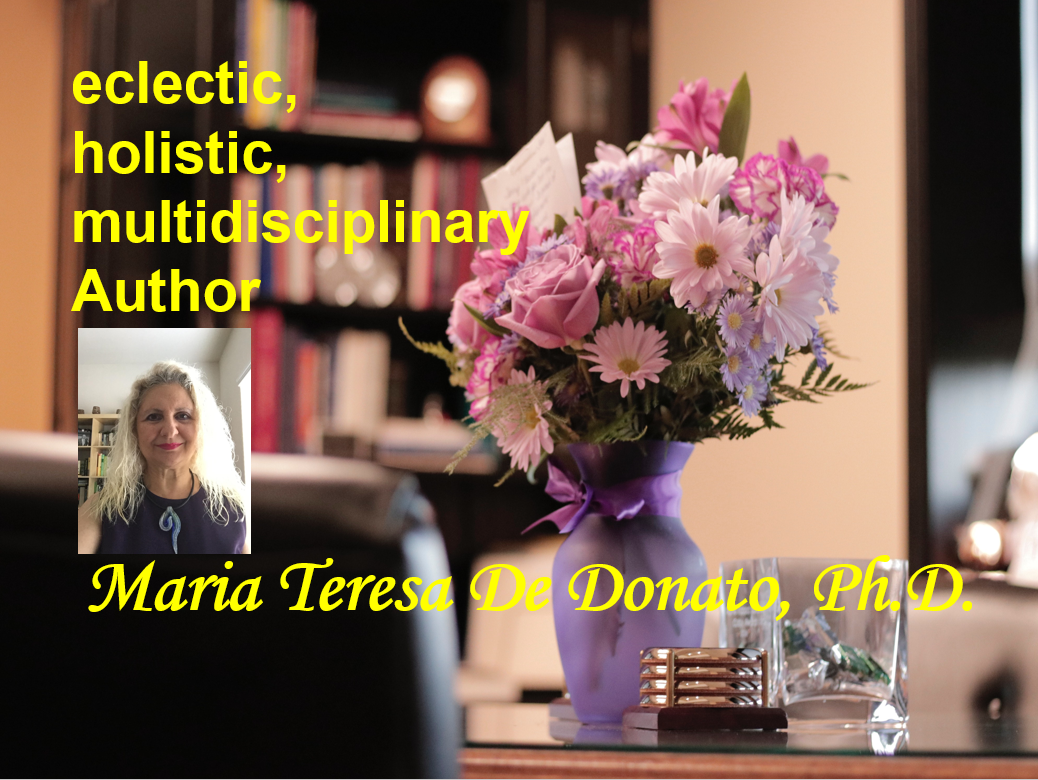by Fiori Picco
Interview by Maria Teresa De Donato
.jpg)
Dear friends,
Today I have the great pleasure and honor of hosting my friend and colleague Fiori Picco, with whom, through various articles that I will prepare during this year, we will explore one of the most ancient and fascinating civilizations and cultures that has ever existed on our planet: the Chinese one.
Fiori, in fact, in addition to being the author of various books, is a sinologist, translator, and publisher.
However, I won’t add anything else because, as usual, I prefer my guests to do so.
MTDD: Hello, Fiori, and welcome to my Blog and Virtual Cultural Salon.
FP: Hello, Maria Teresa. Thank you for this interview. I wish to say hi to all your readers.
MTDD: Fiori, I would like you to introduce yourself to our readers by telling a little about yourself, your studies, your work, your passions, and anything else you would like to share with us.
FP: I was born in Brescia in 1977; my father is from Brescia, and my mother is from Piemonte. I am a sinologist who graduated from Ca’ Foscari Venice University, Department of Oriental Languages. After graduating, I immediately moved to Kunming, the capital of Yunnan, a province located in southwest China, where there is a strong presence of ethnic minorities and where I lived for eight years teaching European culture at the Department of Tourism of the Yunnan Normal University and doing anthropology research. Inspired by local culture and folklore, I started writing my first short stories and novels. Later I returned to Italy but continued my research and writing my books. I have been an SIAE author since 2007 and have been translating works by Asian authors since 2011, collaborating with literary associations. In 2018, with writers from all over the world, I participated for two months in the International Writing Program at the Lu Xun Literary Academy in Beijing. The same year, I received the “Friend of Chinese Literature certificate.” In 2019 I founded Fiori d’Asia Editrice, a multilingual publishing house specializing in Asian literature. I have translated Chinese/Tibetan, Japanese and Vietnamese authors. I have been a jury member of the China Bo’ao International Poetry Festival of Hainan Island for two years. I love exploring various cultures and discovering their traditions, customs, history, and rituals, especially of those endangered people unknown in the West.
MTDD: What attracted you in a particular way, making you opt for the Degree in Chinese Language and Literature?
FP: At age five, I received a picture book as a gift that told the story of a Chinese princess locked up in the Jade Palace. The images, the plot, and the characters struck my fancy, and I decided to study that culture. I’ve always kept my mind the same over time.
.JPG)
MTDD: Without revealing too much, we will have the opportunity to deepen the discussion on “planet China” through the following interviews. Can you tell us something about your life in this great country where you spent eight years?
FP: At the age of twenty-two, I arrived in Kunming alone, but the city welcomed me with its colors, scents, flavors, and the cheerful music of the cucurbit flute, the typical instrument. I felt perfectly fit in. The people were friendly and welcoming and didn’t make me feel homesick. I immediately found many friends and colleagues who involved me in their travels and cultural gatherings. In university, I had students who were a little younger than me, so it was easy to communicate and make friends. In addition to teaching, I worked as an interpreter in factories and came into contact with the indigenous people. I visited villages on the border, high in the mountains, and tropical areas, where I interviewed the natives and sometimes lived in their homes. These testimonies have enriched my cultural baggage and, over time, have become precious material for writing my novels.
MTDD: As I mentioned in the introduction, in addition to being an author, sinologist, and translator, you are also a publisher.
Would you like to introduce us to your publishing house, explaining how it was born and its goals to the public?
FP: For a few years, I collaborated with Italian publishers, but due to a diversity of views and approaches to authors, I decided that the time had come to open my own publishing house to use my method and follow Asian writers who rely entirely on me and want a direct contact following each stage of the production of the book. Fiori d’Asia publishes the Italian translation of works already published in their native Countries, but it is also lucky to have authors who write unpublished works for us. We cooperate with China Writers Association and the Japanese Bilingual Writers Association. We intend to bridge Western and Eastern cultures by promoting valuable works.
MTDD: Moving on to your writing activity, today I would like to focus on your book Giada Rossa- Una vita per la libertà, published in 2020, of which you are also the publisher.
The story, set in China, starts in 1970 and continues to the present day.
Who is Giada Rossa, the protagonist of this novel, and who or what exactly does she represent?
FP: Giada Rossa is a lady I met during my cultural mediation experience in Brescia Hospital and whom I assisted during an operation and in the postoperative period. She didn’t speak Italian and needed my help. During her hospitalization, she told me the story of her life, from childhood to middle age, the ups and downs and difficulties she found during her emigration from China to Italy, crossing the Balkans by foot and the sea with a boat up to landing at the port of Bari. I found her experience dramatic but so real that I asked her permission to write it in a book. She immediately accepted, and we are still in contact today.
%20Copertina%20Giada%20Rossa%20.jpeg)
MTDD: Violence, poverty, clandestinity, and, at the same time, a lot of willpower, courage, and determination seem to be among the fundamental aspects of your novel.
A life lesson, therefore, and an encouragement for us all?
FP: Giada Rossa was kidnapped and sold at the age of five; she lived a denied childhood in an impoverished Jiangxi countryside; she suffered domestic violence from her first husband and mother-in-law; her second husband pushed her to emigrate illegally with the ultimate aim of having a reunification in Italy; during the terrible journey to Europe she was the victim of oppression and abuse, she witnessed horrific violence. Italians and her compatriots in Italy discriminated against her. She spent a period as a homeless without a roof, but she never gave up, also thanks to her positive, vigorous, cheerful, and fatalistic character. She managed to rebel against injustices and recover her dignity. Today she is a serene, happy, integrated, always smiling woman. She is an example for everyone. “Red Jade- A freedom life” might seem like a fantasy story, but it is a real-life testimony.
MTDD: Among the numerous themes that emerge from reading this novel of yours, we also find human trafficking, the exploitation of prostitution, and religious fundamentalism, as well as others that we will explore in the future.
What can you tell us about this, and what was your perception of these issues while speaking with Giada Rossa?
FP: We know very little about illegal Chinese immigration in Italy. Like other ethnic groups, the Chinese also partly arrive on boats in inhumane conditions. When they land, they find enormous difficulties, especially linguistic ones. Contrary to other ethnic groups who can express themselves in English or French, the Chinese speak only their own language, so they find themselves alone and forgotten. Some are recruited for hidden, low-paying jobs. For women, especially the young ones, the prostitution market opens up hidden inside the massage salons, where the living and hygienic conditions are terrible. Every day we see these massage salons on every corner of the city. Getting out of this vicious circle is difficult; you need a strong will. Giada Rossa was lucky because she managed to avoid the loop, but she told me about the troubles of some young compatriots. I have heard borderline and complicated stories as an interpreter at the Court of Justice and in the Prisons. Unfortunately, Catholic religious fundamentalism is an Italian reality, and Giada Rossa was its victim. The decision to remain faithful to her Buddhist doctrine and not to renounce it in order to convert to the Catholic one marginalized her to the point of being kicked out of the workplace when she was sick.
%20(1).JPG)
MTDD: How is the concept of ‘freedom’ understood in China or by a Chinese, regardless of where he lives? In your opinion, since you are familiar with this culture, are there differences in the perception and understanding of this term between the Eastern and Western worlds, and if so, what are they?
FP: In the West, we are individualists, especially Italian people. We first think about our well-being, happiness, and personal realization. In the East, it is different; the concept of sacrifice, renunciation, and honor in the name of the family and the community is rooted. Confucius taught the Chinese not to transgress, to be responsible, and to give up their freedom for the common good. We find the same principles in Japan too.
%20(2).JPG)
MTDD: I know that thanks to your novel, you have obtained various Awards and Acknowledgments.
Would you like to tell us about them?
FP: In 2020, the novel Giada Rossa received the Special Jury Prize among the six finalists of the Latina City International Literary Prize. At the same time, it was a finalist with honor at the Caravaggio-Argentario Prize. In 2021-2022 it was included in the list of Italy’s two hundred most beautiful books by the Three Colors, Cinema, Culture and Society International Prize of Lazio.
MTDD: Are there other aspects of your book that we still need to discuss and that, while waiting for our next interview, you would like to mention?
FP: An interesting aspect of the book is the role of women who, in Chinese society during the Maoist period, became the Other Half of Heaven by acquiring equal rights in good and evil. It is a topic that deserves further discussion.
MTDD: Fiori, how can anyone wishing to buy your books contact you?
FP: The site of my publishing house is http://www.fioridasiaeditrice.com/
My blog is: https://fioripicco.blogspot.com/
My email is: info@fioridasiaeditrice.com
My books have global distribution in the main Amazon stores.
MTDD: Thank you, Fiori, for participating in our first interview. I am delighted to have you as my guest.
FP: Thanks for this opportunity. I’m happy to make my works known to readers from more Countries.
.jpg)

